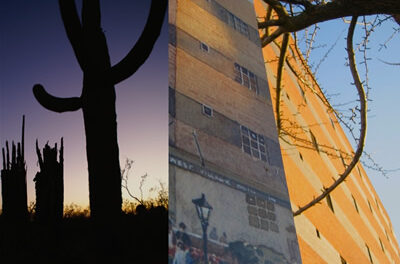Many complain that opera is a dead genre, that continuing reproductions of old masterpieces only embalm a moribund practice behind museum glass. North Carolina Opera’s production of La Traviata brings new life to this classic opera, offering both new listeners and seasoned opera buffs a fresh yet traditional reading of one of Verdi’s greatest operas.
The story’s near-universal simplicity has helped to establish the opera’s status as the canonical opera: as an adaptation of Alexandre Dumas’ (fils) The Lady of the Camellias, it presents the graceful Parisian courtesan Violetta who, suffering from consumption, abandons her pleasure-seeking life to live with Alfredo Germont in the countryside. Alfredo’s father, unbeknownst to Alfredo, pleads with Violetta to leave Alfredo because their illicit relationship – outside the bonds of institutional marriage – bars Alfredo’s sister from marrying. In an act of self-sacrifice, Violetta leaves Alfredo. He insults her publicly, but returns to seek reconciliation. She dies in his arms.
The three leading roles of the opera – Violetta , Alfredo Germont, and Giorgio Germont – were sung exquisitely by rising stars of the opera world. Though opera outside big cities tends to garner a provincial reputation, there was nothing lacking in this presentation: Mario Chang, singing Alfredo, is an elegant lyric tenor, and his theatrical poise added much drama to the opera. Chang paused at the perfect moments, offering a moment’s hesitation before toasting with “Libiamo ne’ lieti calici”. Joo Won Kang, as Giorgio Germont, portrayed a complex character: not a villain but not a hero; his stentorian, precise baritone brought pathos to the opera’s second act. But Jacqueline Echols, as Violetta, clearly stole the show. The famously difficult part of Violetta came across with ease: the coloratura passages were precise, and her dynamic range was incredibly wide. She is a flexible singer with an acute ear for drama, and her vocal acrobatics sounded effortless.
So overwhelming were these three stars that the remainder of the cast and chorus sounded weak without their presence, as in the beginning of the second scene of Act II. Not that the other cast members were that weak: Jennnifer Lararz (Flora) and Lora Fabio (Annina), Jacob Wright (Gastone), Donald Hartmann (Baron Douphol), and Jesse Malgieri (Marquis d’Oboginy) were all confident and present in their roles, and Alfred Sturgis’ direction of the chorus was firm and assured; but compared to Chang, Kang, and Echols, their combined light was a bit dimmer.
Timothy Myers conducted an excellent orchestra; his musical insight and instincts are perfect for the operatic pit, and his connection with the singers during moments of recitative was obvious. Myers is an astoundingly gifted young musician and a true treasure to have with the North Carolina Opera as its musical director.
The scenery, costumes, and props, provided by Nashville Opera, fit together in a cohesive presentation; each act was simple in its staging and design, but theatrically effective: the red of the first act – the background to Violetta’s hedonism – was in stark contrast to the pure white of Violetta and Alfredo’s country escape of Act II; the fifteen minutes of bliss that Verdi affords the audience seemed paradisiacal in contrast to the rest of the opera, and the entrance of Germont père in black was an obvious harbinger of the coming downward spiral.
This was a masterful production, bringing to light the true gift of opera: drama and music combined to the point where neither dominated the other. Echols, along with all the singers, was truly gifted in blurring the line between words and music: the words were music. The audience left the opera having shared a three-hour tour of passion, love, redemption, and repentance; that Violetta dies on carnival, the eve of the fasting period Christians hold before the resurrection of their redeemer, is obviously significant: Verdi has constructed a musical myth with the power to shock and inspire almost any viewer.
La Traviata will be repeated on the afternoon of March 1, in the same venue. For details, see the sidebar.











